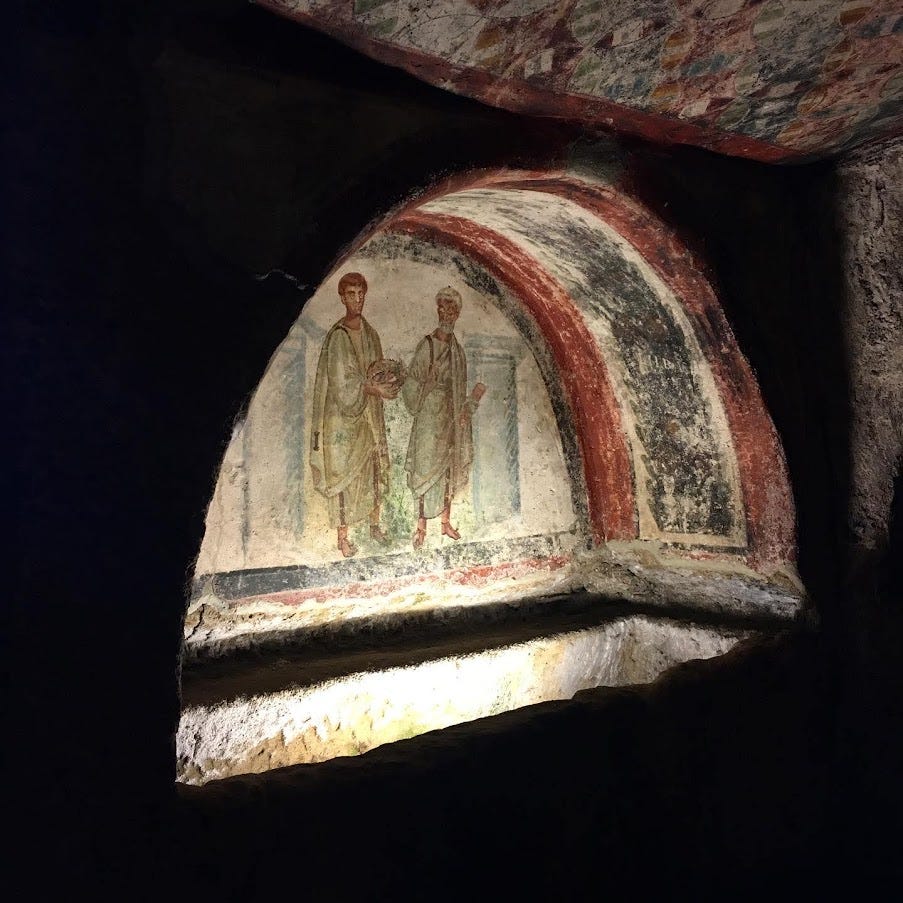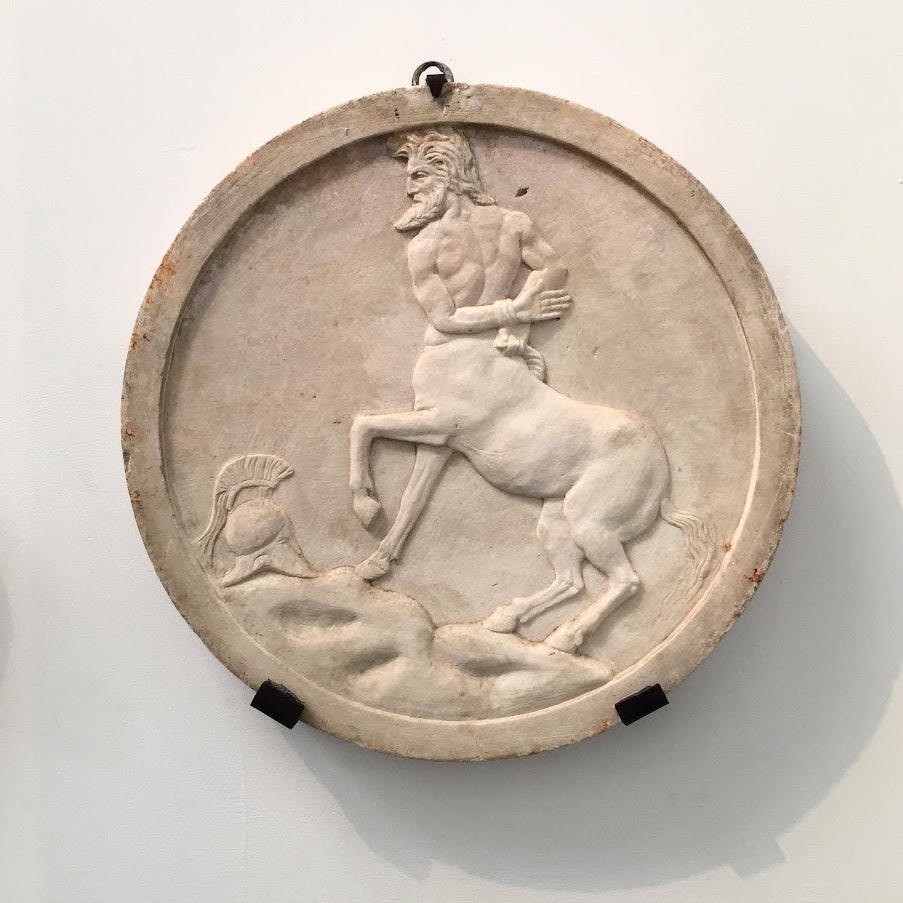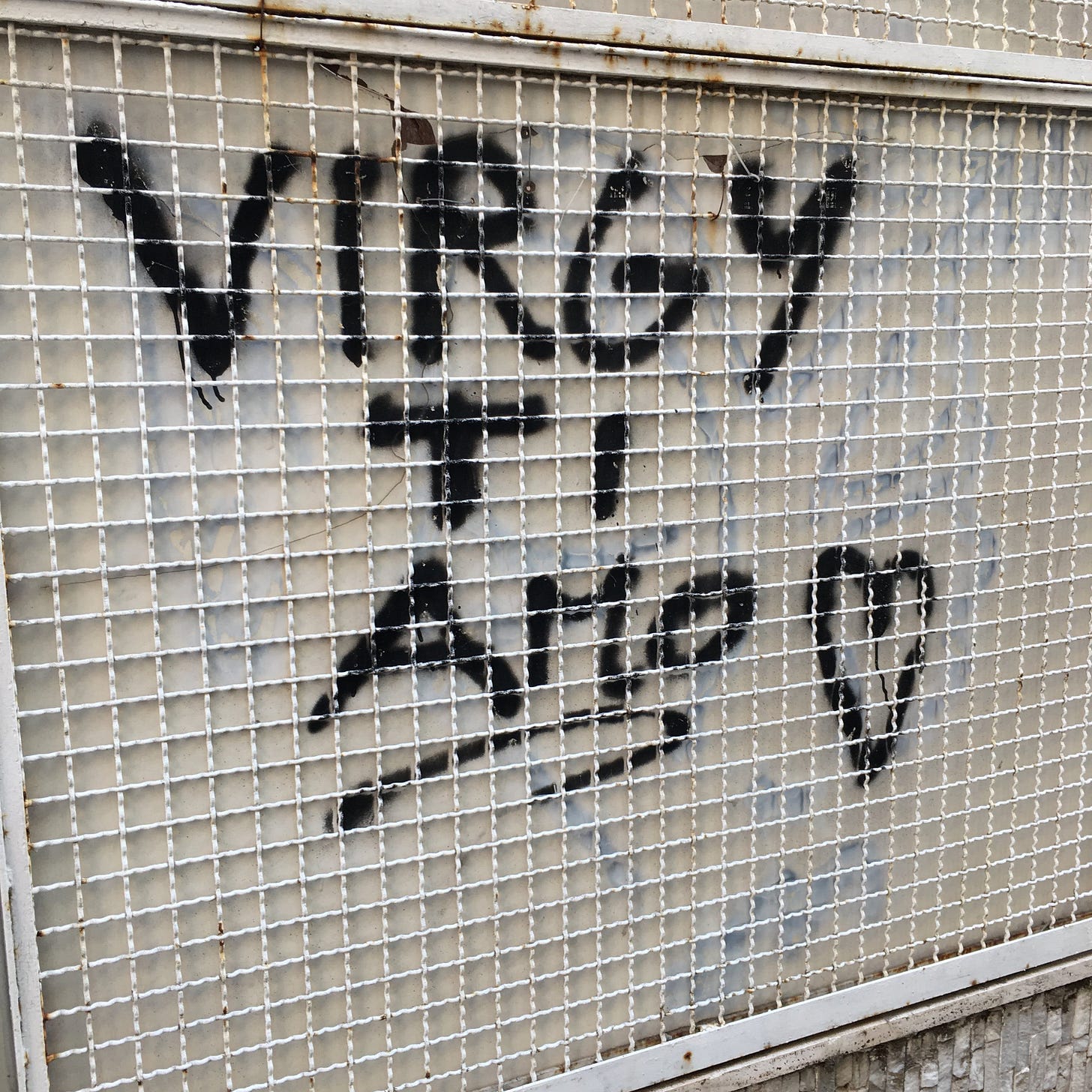It feels like a crass way to introduce a character, but I will start with the buttocks; after all, that was enough to catch my eye, and to set rolling our own narrative. It’s good enough for you. The day had been pleasant enough until that moment. I had spent most of it training my eye, first to the darkness of the catacombs and then to the rare moments of colour within the darkness, the ancient frescoes that had been rendered directly onto the walls, into the alcoves above the graves that have sat under the hill for almost two millennia. They were the reason for my visit — to complete my masters studies in early Christian art in the Mediterranean — and the pair of buttocks that I encountered later in the evening, my eyes readjusting to the hazy pink sky, a colour that that seemed to drift like smoke across the Bay of Naples, was one of the many unexpected highlights of a city whose every turn offered something both old and new. I find myself disgusted by how easily this intoxicates; it makes me feel like a cheap drunk, stumbling from my bar stool after only a second glass of white wine, but perhaps more shameful is being unable to find the new words to describe something that’s image is already so clearly rendered in the imagination of a certain type of gay man. Indeed, that is the subject of such a man’s art for two centuries. That, after all, is what attracted me to early Christian art in the first place, in such stark contrast to what Christian art became. There is something very raw in the search for an imagery that eschews the catastrophic, the grand, the pagan, and tries to bring to its representation of the world something intimate, human, in small remembrance. Perhaps that is what is so intoxicating about the place; it is not the baroque, but the baroque crumbling back into the earth, the yellow paint fading into the sun and peeling into the air, while the cars continue to chase each other down the rolling black streets.
Writing for the London Review of Books in 1995, Edmund White was taking French literary criticism of his then-new biography of Jean Genet in characteristically good humour. He was accused of pigeon-holing the French author as a “gay writer” — such characterisation, White wrote, appalled the French bourgeoisie’s Republican ideals, contravening a sort of literary laïcité, that age-old heterosexual proverb of “just a great artist no need to bring sexual orientation into it.” But to ignore the obvious, that Genet was a homosexual, is to ignore not just a truth about his life, but an important component of his work. Yet White disputes the idea of some sort of transnational, transhistorical gay sensibility. I think he is right here, to an extent; there is no great spirit of the homosexual that floats across the time, its hallowed and scented mist penetrating cruising ground and gabinete secreto, piers and university halls alike. As White writes, there are just experiences, and experiences differ not just through gender, race, and class, but through chance and temperament, identification and climate. And yet! And yet… The Homosexual is a political subject, created through not just identification but crucially self-identification. The creation of that subject does have a cultural history, and it is one racked with the same omissions of the experiences of homosexuality that are not, by an large, white and male and middle or upper class.
Yet what is often compelling about that cultural and literary history is that, for its time, twentieth century gay literature (the term White accepts and the French reject) is intoxicated itself by its own listlessness, its ability to drift across class and social formation. Homosexuality became a sort of key for white male writers that could unlock a subject position in which the homosexual was not the centre, but the observer, of a narrative, despite his race and gender. White goes so far as to suggest that the homosexual subject of the work of Proust or Holllinghurst might not even exist, saying “Perhaps homosexuality is a non-subject – endlessly fertile, ceaselessly shifting, devoid of all stable content, an invitation to musing rather than a fixed object of enquiry.” And so it is; in Hollinghurst, the homosexual passes across class borders as a spy, an audience surrogate for the middle classes within the ruling elite; in Isherwood, it works the opposite way, a prurient camera as an eye into a collapsing Berlin (albeit a camera with a director and editor built in). Class and nation are supposedly perceived from the inside, out. Genet remains perhaps the most interesting transitional subject, making a “Genet” the narrator and audience surrogate writing for a class and sexuality that he does not himself inhabit. White: ‘Genet felt that homosexuality had given him an entrée into many different worlds that he would never have known otherwise. He once said that, unlike Proust and Gide, who were liars and cheaters, he’d never wanted to downplay his own homosexuality in order to assume a role in the social comedy.’ This figure of the quiet narrative assassin sneaking between the oblivious heterosexual worlds, his eyes well accustomed to threat and subtext, may not be a gay sensibility, but it is the basis for, in my opinion, a gay realism. All this is enabled by you, the prurient, anonymous, fee-paying secular audience.
Bearing that in mind, let’s get back to his buttocks. I saw him first on the long promenade that stretches from the Castel dell’Ovo westwards along the coast, a once grand nineteenth century strip of ornamental gardens now pleasing dotted with street vendors selling mobile phone cases and counterfeit flip-flops. He was leaning over the railings just beyond a little truck selling fresh, icy cold lemon granitas. I watched him as the vendor carved the frozen block into a little plastic cup, him alone, watching the early evening across the water as pleasure boats returned their bronzed cargoes of unimaginable wealth from Capri the Neapolitan harbour. He was resting on his forearms, bent over, his weight shifting from one leg to another. He was a touch younger than me, I’d guess; broad but not filled out, but his waist and thighs and buttocks holding an unmistakable weight of an uncomplicated rich life. It was a mothered male body. Food and saltwater and football, all built up into the muscular forms that shifted to and fro beneath his shorts. As I paid, my eyes still on him, he turned, and caught me, and neither of us shifted our gaze.
We took his moped back to my small rented apartment; while finishing his studies, he was still living with his parents. That was fine with me. My little room was light and airy, high on the hillside and in the block, the sea air managing to pull out the suffocating warmth of mid afternoon, and the chance to clutch against his stomach as he pulled between cars. There wasn’t much to say when I shut the door behind us; I didn’t draw the shutters nor fetch him a beer, but simply ran my hands along his body. His face held the same sort of crudeness as the paintings I spent the day with, both in its literal representation; a broad smile framed by full lips and thick eyebrows; and in the brushstrokes on the wall, each part of his body a clear plane yet holding within the colour almost imperceptible brushstrokes that gave depth and fullness to him. We could barely speak to each other, and so we fucked, and I imagined what he was saying and I dare say he did the same. There is not much to say here — anything confessional will be mere pornography — although I will note that in England, I cannot remember ever having laughed.
My research was mainly concluded, but for a few stragglers, paintings locked away except for certain weekday afternoons, by appointment. I had another month before I had to return to Oxford, so I began something new to me, a novel.
I wonder if this role of the gay male realist has run its course. As an observer of the heterosexual, the gay man is now fatally compromised by a generalised empathy and awareness of the condition, despite our protestations. As an observer full stop, has not the white gay cis man become the very model of someone who has already said too much? Moralists would suggest so. White suggests that gay autofiction differs from the realistic novel because ‘it not only embodies the continuing documentary ambitions of the realistic novel but because it also participates just as actively in a very different tradition – the confession, which is by its very nature religious and exemplary.’ Is there anything left to confess, that might complicate the wide-eyed command that the experiences described by the realist should be welcomed non-judgmentally and with open arms as a sign that their experience is valid, and, more importantly, that the audience is the accredited validator?
While the homosexual white male has, since White wrote his essay, been instrumentalised as an icon of the enduring potency of Western liberalism, that extends only to the figure of this social form, kids and vows and all, and not to something wider, something far more realistic. Ironically, it’s the nonexistent sensibility that has been captured and bottled as a Western value, but the experience? The experience continues to stink up the street in ever more unimaginable ways. The wider constellation of sodomitical life (far from limited to the gay male) has never been reconciled with a heterosexual culture that can only really read Genet, whatever they might say, with appreciative nods. There remains a perverse contagion, and the experience, ever changing, still bears describing. The problem is finding those to confess.
Over the following days, waking and dipping into my new pages, I found my mind repeatedly wandering back to his body; the two brought together to produce a whole human. We have all fantasised about past lovers, of course; our memory produces the most wonderful and rich stories of the past, replaying the tender moments where fingers pushed so hard they reached the bone, where he spat in my mouth, where he was closer to the heart of me than my own arms and legs would take me. Such memories silently open a door left on the latch, and present themselves in our mind when our hands are deep in a sink of cold water or our feet wait impatiently in the post office line.
With him, it was different. I imagined what was still to come; new meetings in the small park by the ceramic museum, watching the turtles crowded on top of each other in the tiny pond, his cup running below the small of my back and cupping me between the legs. I imagined more, about his life, meeting his brothers on the sand, the inside of my bedroom when he would sneak out at 1am, leaving Oxford for good, his friends at the football who would never acknowledge me and I would be happy with that. He was a crush — just for a week or two — but a crush brings with it a whole new drive to imagine. People say that a crush is just a projection of all your desires onto someone before you know enough about them that they could never live up to it. But I think a crush is actually a fictionalisation of yourself as another person, an autofiction of self-desire. For two weeks I was quiet and studious and unnoticed but still wanted and cared for and fucked.
When I started my novel, I began to think about all the places it might go. I looked online at how to find a publisher, and then when I had read all that, how to find an agent, and then I imagined the cover, and the cover inside the cover of other magazines, and then the cover on the beach towels of the boys who were laying all around me on the beach, even though they had no book covers there now, in the real world. But mine would be so good, so popular, that they would all buy it and talk about it. I had a crush on my own book, but who wouldn’t, because look at its buttocks against the evening sea. Yet as I wrote it my urge to confess grew stronger and it looked less and less like the soft and beautiful book, the demure book who was still caring and secretly a good fuck. I couldn’t believe I was learning all these new things about my book. It had disgusting habits, and not just chewing with its mouthful. It didn’t care for me much, and the realism was too real, and I was too unpleasant within its pages. There were scenes I couldn’t stomach. It was too violent. At first, I spent everyday thinking about it, but now, there are some days I don’t even what to see it, I don’t want it to come around. The problem is, it’s not what I hoped it would be, but sometimes you can’t give up a good fuck.
Thank you again to all my subscribers. Please feel free to forward to anyone who might be interested.
For those just visiting, you can subscribe here, and, if you like it, please do share on social media etc. It helps other people find my newsletter.
Paid subscribers get access to the entire archive of 80+ essays, including recent posts such as this essay on Fernando Pessoa, the European periphery and Barrow-in-Furness, this radio-visual essay on queer protest, and this essay on the remembrance culture around Walter Benjamin.









I am psychic as when I put the computer on this morning I thought 'there will be a utopian drivel piece today'!